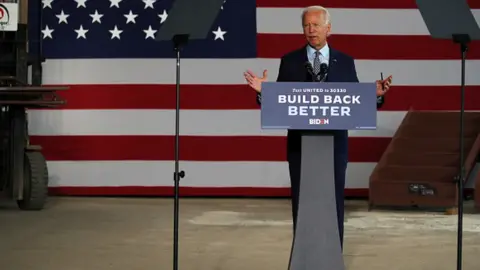Biden challenges Trump with ‘Buy American’ economic plan
 Getty Images
Getty ImagesDemocratic presidential contender Joe Biden has laid out his rescue plan for the coronavirus-crippled US economy, while berating President Donald Trump as incompetent.
Mr Biden said his $700bn (£560bn) plan would be the biggest investment in the US economy since World War Two.
The "Build Back Better" agenda, he said, would spur a manufacturing and technology jobs boom.
The Trump campaign responded that the plan would inflict "catastrophe".
Mr Biden is all but guaranteed to face off with Mr Trump in this November's presidential election.
Speaking at a metalworks firm near his childhood hometown of Scranton, Pennsylvania, on Thursday, Mr Biden said the president's failures had "come with a terrible human cost and a deep economic toll".
"Time and again, working families are paying the price for this administration's incompetence," Mr Biden said.
November's election is expected to be dominated by the coronavirus pandemic and its economic fallout, which has pushed tens of millions of Americans into unemployment. More than 130,000 people have died with the virus.
Many voters are concerned by the Trump administration's handling of the pandemic. His divisive approach to the country's recent wave of anti-racism protests has also come under sharp scrutiny.
Opinion polls show Mr Biden with an almost double-digit lead over Mr Trump.
Analysts have urged caution in over-interpreting the polls, but Mr Biden's lead is far greater than that of Mr Trump's 2016 opponent Hillary Clinton at the same point in the campaign.
What else did Mr Biden say in his speech?
The former vice-president, who served under Barack Obama, struck an optimistic tone as he presented an economic programme, which he said would create at least five million jobs in manufacturing and innovation.
A key theme of his plan, Mr Biden said, was to "Buy American". He proposed a $400bn increase in government spending on US-made products, in addition to spending $300bn on the research and development of new technologies, including electric vehicles and 5G networks.
"When the federal government spends taxpayers' money, we should use it to buy American products and support American jobs," he said
Pennsylvania is a battleground state seen as critical to the outcome of the election. Mr Trump won it in 2016 by a thin margin.
The "Buy American" tagline has drawn comparisons to President's Trump's "American First" agenda.
But Mr Biden said Mr Trump had failed to "bring back jobs and manufacturing" and, during the pandemic, had protected wealthy "cronies and pals" instead of working-class families.
"The truth is throughout this crisis, Donald Trump has been almost singularly focused on the stock market, the Dow and NASDAQ. Not you. Not your families," Mr Biden said.
The Trump campaign took a dim view of Mr Biden's economic proposals.
"Mr Biden's wilful attack on our jobs, our families, and the American way of life will reverse all the gains we've made together and plunge us into economic catastrophe," spokesman Hogan Gidley said.
Where are we in the election race?
Mr Biden, 77, officially secured the Democratic presidential nomination in June. He had been the effective nominee since left-wing Bernie Sanders withdrew from the race in April.
It is Mr Biden's third bid for the presidency, after failed runs in 1988 and 2008.
Mr Obama endorsed Mr Biden in April, saying in a video that his former vice-president had "all the qualities we need in a president right now".
A former US Senator from Delaware, Mr Biden is yet to choose his running mate - the person who would become vice-president should he be elected. Kamala Harris, a Democratic senator from California, is considered the front-runner.
Both the Democratic and Republican party conventions are scheduled for August. At those events, delegates will formally choose each party's nominees for president and vice-president in the 2020 election, due to take place on 3 November.
